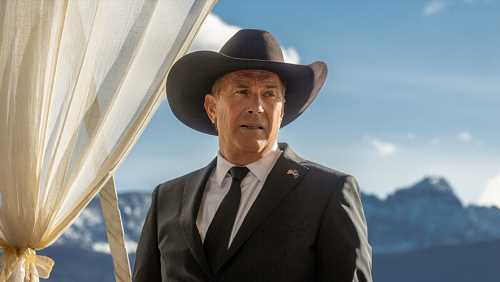Viewers who tuned in to watch repeats of “Yellowstone” on CBS Sunday night got something they might not have expected — two commercials telling them to watch the show somewhere else.
CBS sold national ad time during the program to rival NBCUniversal, which ran a spot highlighting the availability of the Western-themed drama series on its Peacock streaming hub. “Peacock has all episodes of ‘Yellowstone,’” the commercial says via graphics that appear over scenes from the program. “Stream every season now.” Peacock has streaming rights to the program, even though it’s produced by CBS parent Paramount Global, which first airs the series on its TV networks. “This is a declaration of war,” says one “Yellowstone” character at the end of the spot.
The advertising arrangement shows just how much the advent of streaming has changed relationships between fierce rivals like NBC and CBS. Paramount Global generates revenue from the sale of “Yellowstone” rights to Peacock, and from the Peacock commercial — even if NBC is trying to dip into CBS’ pool of viewers to bring new audiences to the show.
The “Yellowstone” episodes wouldn’t be on CBS under regular circumstances. The network is running them as a sort of stopgap measure amid months-long labor strikes by Hollywood’s writers’ and actors’ unions. Even so, the repeats seem to be a hit. A two-hour block of “Yellowstone” lured more than six million viewers to the network in their debut last week. A live audience of that size is tough for any advertiser to ignore.
Still, the idea of letting a rival come in to woo away viewers is a bit of a risk — a move tantamount to a homeowner letting termites come into a house and gnaw at its innards. Even so, TV networks in recent years have been happy to sell valuable ad time to new competitors who use the commercial breaks to tell viewers, essentially, to use their remotes to watch something interesting on one of their services. To do so, of course, the couch potatoes must stop watching regular TV.
The spate of TV ads from new-tech players such as Amazon, Netflix, Google and Hulu has expanded counter to past TV-industry policy. For decades, TV networks kept rivals off national ad breaks in the belief that viewers who saw such promotions would change the channel and take their viewership with them. As HBO made a name for itself with landmark series like “The Sopranos,” “Sex in the City” and “True Blood,” it often focused its marketing on eye-popping print advertising and clever Web marketing, because many TV networks barred the doors to ads for the shows. In the past, TV networks would not even run ads featuring actors who appeared in programs broadcast on rivals. A case in point: In 1997, General Motors’ Cadillac ran an ad featuring actor Dennis Franz as a cop handing out a ticket. At the time, he starred as a police detective on ABC’s “NYPD Blue.” CBS and NBC vetoed the spot.
In a different era, companies that tried such stuff had to do it In under-the-radar fashion. In 2004, Time Warner for several weeks ran ads for off-network repeats of the CBS program “Without A Trace” during local time in broadcasts of “E.R.” Why? Because CBS ran “Without A Trace” in the same time slot. “If you’ve been watching ‘E.R.’ on Thursday nights,” says a narrator, “you’ve missed the drama critics say is…Gripping. Stylish. Addictive.” NBC wasn’t immediately aware of the ploy because the spots were sold by individual station affiliates, not by the network itself.
Even today, the policy continues to affect who can advertise where. Despite increasingly loose rules on network TV, many streamers won’t accept rivals’ commercials. Netflix, Max and Disney’s Hulu and Disney+ do not take ads that tout rival streaming services or the shows that run on them, according to executives familiar with the policies. And Paramount+, part of Paramount Global, tends to accept ads only from streaming competitors with whom the company might already do business, according to a person familiar with the situation.
Running Peacock’s “Yellowstone” spots might augment Paramount’s revenue. If more people watch the series on the NBC property, executives there might want to extend their rights to the program. And since the CBS episodes are repeats, Paramount executives may have bet the show’s core audience has already watched them — and may be out there streaming something else.
Read More About:
Source: Read Full Article
